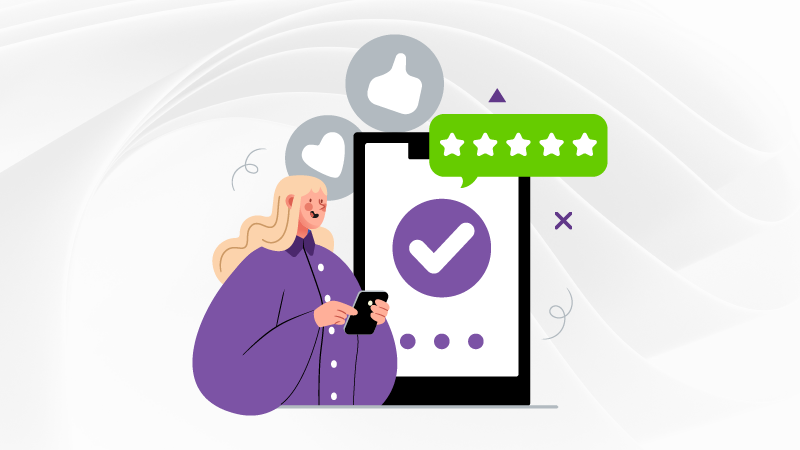
Customer data can be a double edged-sword. It holds undoubted potential in customer experience (CX): information that establishes a profile of a customer's preferences, purchase history and past support inquiries can facilitate the delivery of enhanced, personalized customer experiences. But the collection and storage of this data also adds risk. If this data is not handled and stored securely, bad actors could obtain it and use it to perpetuate cybercrimes.
It's no wonder then that people place a high level of importance on data security when they are weighing up competitive products and services. A Cisco report, Building Consumer Confidence Through Transparency and Control, found that 47% of survey respondents have switched companies or providers over data policies or data sharing practices.
And while there may be a tendency to focus on the company or provider a customer might be switching from, it's important to also think about who they are switching to. In other words, brands who lead with data security can meet a customer need and realize a significant strategic opportunity.
It's an idea that came up recently on Questions for now, a TELUS Digital podcast. On the episode, guest Dr. Dave Chatterjee, associate professor, management information systems at the University of Georgia implored brands to, "Treat security as a core function. Treat security as a core capability. Treat security as a strategic opportunity."
The advice is sound — and timely. To meet the expectations of today's customers, more and more customer experience leaders are prioritizing data security. Let's take a closer look at the relationship between security and customer trust, as well as the ways brands can gain a competitive advantage through their security policies and practices.
Dr. Dave Chatterjee, Ph.D., associate professor, management information systems at the University of Georgia, on turning data security into a strategic opportunity on the Questions for now episode: "How can brands rethink data security to maintain customer trust?"Data security is a priority for CX leaders
A data breach is a breach of trust. In fact, 65% of data breach victims lose trust in the aftermath of a breach, per Centrify (now Delinea). The link between data security and trust is front and center in the digital customer experience context. "Customers are not only looking for the best quality products at the cheapest possible price, but they also want a very secure experience," explains Dr. Chatterjee.
Recognizing the connection between data security and trust, digital CX leaders are making data security a priority.
In a TELUS Digital survey, created in partnership with Statista, 250 enterprise leaders were asked questions about where they plan to invest in digital CX technology. There are a number of important, relevant, findings to consider:
- 18% of leaders stated that supporting long-term and sustainable customer loyalty was their primary digital CX goal, the second most common response after improving the quality of customer service.
- 1 in 3 leaders signaled that they regard customer data and analytics as an investment priority.
- 38% of leaders identified "Ensuring data security and compliance" as a challenge to achieving their digital CX goals.
- Leaders ranked "Prioritizing privacy, data protection and transparency" as the number two trend in digital CX for 2023.
- 35% of leaders said "Transparency and data security" is a quality that they look for in a digital CX partner.
Taken together, these survey results demonstrate that CX leaders are thinking critically about the ways they can create enduring customer loyalty and that they see data security as key to doing so.
Plan for secure customer service from the start
For brands looking to safeguard their data, there's a relevant, fundamental principle to consider. It's called security by design, and can be defined as an approach to software or product development that minimizes vulnerabilities through the early and ongoing application of safeguards and security best practices. Beyond software engineering, it is a principle that can be applied to a wide range of processes and contexts, helping brands to protect customers, their data and their trust.
On the aforementioned podcast episode, Steve Jablonski, vice president of information security at TELUS Digital, makes it clear that security must be present in a brand's thinking early on — and consistently thereafter. So when you're taking a hard look at your customer journeys and thinking about the data that you'll be asking them to share and the ways you'll put that data to use, it's important that you do so with security in mind.
For maximum effect, that type of security mindset should be applied holistically. Jablonski discusses the importance of security by design in terms of technology, people and processes. Regarding technology, Jablonski says it's important for brands to develop "secure code as part of the design process rather than being a bolt-on once you've developed and deployed something." But he doesn't stop there. Instead, he encourages brands to ask themselves, "How can we train the people so that they're that human firewall, [...] so that they're aware of these threats that are out there? And then how do we set up processes so that security is built [in]?"
Of course, keeping security in mind also means being aware that there may come a time when things go wrong. This is why brands applying security by design must build redundancy and resiliency into their operations. That way, if — despite best intentions and efforts — defenses are compromised and customer data is leaked, you retain the ability to be transparent with your customers. Trust, after all, is hard won and easily lost. "And trust," says Jablonski, "is built on communication."
Find a partner who can maintain customer service security
Leaders who outsource aspects of their customer experience need to make sure that their providers are able to uphold their standards for privacy and security. Data security and trust are connected, and brands can't afford a weak link in the chain. To resurface the survey from TELUS Digital, created in partnership with Statista, 35% of leaders reported that "Transparency and data security" is a quality that they look for in a digital CX partner.
Confidence that a provider can meet a brand's security requirements typically comes from the provider having a capable, trained team familiar with the threats at play; a technology stack that's up to date, patched and that adds redundancy to the overall security of the operation; and robust processes that are routinely scrutinized and honed with the latest market intelligence. Of course, to be worthy of consideration in the first place, the provider should also have the requisite certifications to provide secure services in the countries and industries in which you operate.
A provider can become a trusted partner and a valuable resource when they bring specialized cybersecurity expertise that can strengthen the entire operation. This brings up the idea of cross-vertical experience — the deep, earned knowledge that top providers bring to the table after years of partnering with hundreds of brands across industries and geographies. In the context of customer service security, that might mean taking specific knowledge gained from time supporting highly-regulated industries like healthcare and applying the best practices to keep player data safe in the games industry.
Act on your data security priorities
Tasked with delivering positive experiences that increase customer satisfaction and customer lifetime value, today's CX leaders are considering the relationship between data security and customer trust. It's an important relationship to understand, which offers some key takeaways:
- Misusing or misplacing customer data can result in a loss of trust, and ultimately, a loss of customers.
- Leading with security can foster and maintain trust and therefore long-term customer loyalty. An impressive 95% of customers report that their trust in a brand makes them more likely to remain loyal to it, according to a Salesforce survey.
- Recognizing the importance of data security, CX leaders are investing accordingly.
But even if that's clear, applying these ideas to deliver customer experiences that are both intuitive and safe isn't always easy. Remember, 38% of your peers see ensuring data security and compliance as a challenge to achieving their digital CX goals. If you recognize that challenge and are looking for a partner who can help you rise above it, reach out today.



